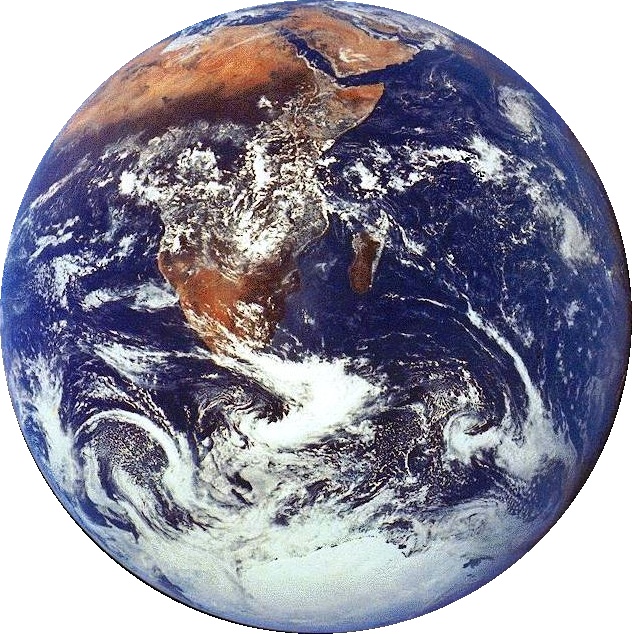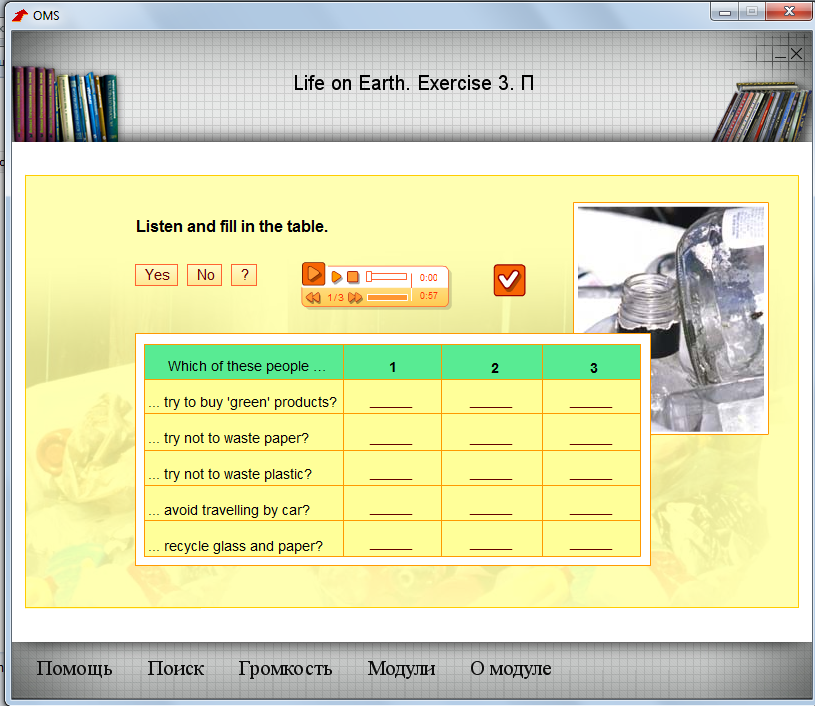Конспект урока для 8 класса «Экология. Сможем ли мы спасти планету?»
Урок английского языка в 8 классе
по теме: «Экология. Сможем ли мы спасти планету?»
учебник Биболетовой М.З. для общеобразовательных учреждений 8 класс
Учитель: Шарипова Н. Т.
МБОУ Пестриковская СОШ
Краснослободск, 2014
Урок английского языка в 8 классе
по теме: «Экология. Сможем ли мы спасти планету?»
Тема: Ecology. Can our Planet be Saved?
Цель: углубление и расширение знаний учащихся об экологии
Задачи:
Учебные - 1) введение и семантизация новых лексических единиц по теме;
2) совершенствование навыков аудирования;
3) активизация навыков поискового чтения;
4) совершенствование навыков монологической и диалоговой речи;
5) использование изученной грамматики (Active/Passive Voice) в устной речи.
Развивающие - 1) развитие мышления, внимания, памяти, языковой догадки;
2) развитие самостоятельности и креативности;
3) развитие умений взаимодействия в паре/
группе;
4) расширение кругозора (развитие лингвострановедческой компетенции).
Воспитывающие:
1) убедить учащихся в важности решения экологических проблем;
2) воспитывать уважение к собеседнику, умение выслушать;
3) научить ребят сотрудничеству и работе в группе.
Оборудование: постеры, призывающие беречь природу; раздаточный материал Ecological Glossary, карточки с заданиями, аудиозапись, иллюстрация к тексту аудирования, мультимедийная презентация, ноутбук, аудиосистема.
Оформление доски:
Walk lightly on the Earth. See but don’t be seen. Hear, but don’t be heard. What you carry in, carry out. Take only memories, leave only footprints.
Легко шагай по планете Земля. Смотри, но будь невидим. Слушай, но будь бесшумен. Что принёс, унеси с собой. Возьми только воспоминания и оставь только следы.(Надпись на входе в Канадский национальный природный парк)
Ход урока:
1. Организационный момент. Приветствие.
Good morning, girls and boys! Glad to see you. Sit down, please.
2. Вступительное слово учителя: сообщение темы урока и плана работы. T- P
T: April, 22 is a special day around the world. On that day people of the Earth celebrate Earth Day. Today at our lesson we’ll discuss a very important problem, may be the most important problem for our Planet and the people living on it.
3. Тренировка навыков кратких монологических высказываний Т-Р (2 min)
If you go camping in Canadian national park, you’ll be told (на экране появляется надпись):
Walk lightly on the Earth. See but don’t be seen. Hear, but don’t be heard. What you carry in, carry out. Take only memories, leave only footprints.
T: Don’t you think that these words can be the motto of our lesson today?
4. Отработка тематической лексики. Фронтальная работа. P (3min)
Many years ago people didn’t have the slightest idea of the term ecology, but nowadays reading newspapers, listening to the radio or watching TV we meet this word regularly, so what is ecology?
P: Ecology is the study of plants and animals in relation to their environment.
T: Yes, but while telling us about ecological problems our ecologists use many ecological notions. Let’s have a look at some of these notions. (на партах учащихся Ecological Glossary)
Let’s read and translate them.
Glossary
Acid rain – when harmful gases from cars and power plants are released into the air and fall back to the Earth with rain or snow.
Atmosphere – all the gases around the Earth
Carbon dioxide – a gas in the atmosphere. The gas that we breathe out.
CFCs – man-made chemicals which destroy the ozone layer
Ecology – the study of organisms and their environment.
Ecosystem - a community of plants and animals living together.
Global warming – an increase in the Earth’s temperature, caused by a build-up of carbon dioxide in the atmosphere.
Greenhouse effect – the Earth is becoming warmer because there is too much carbon dioxide (and several other gases) in the atmosphere. This is called the ‘greenhouse effect’
Ozone (O ) – a type of oxygen
Ozone layer – this is in the atmosphere, between 10km and 60km above the Earth. The ozone stops a lot of the ultraviolet radiation from the sun.
Recycle – to use over and over again. Renewable resource.
Solar energy – energy that comes from the sun.
Smog - brown air pollution that comes from cars and factories; it makes the air unsafe for people, animals and plants to breathe.
Toxic - another word for poisonous.
Ultraviolet radiation – part of sunlight.
5. Проверка домашнего задания. Представление презентаций. Р (15 min)
T: The protection of nature has become one of the most burning problems. The nature provides people with mineral resources, forests and clean water, but the development of industry has had a bad influence on the nature of the whole world. Our health depends on our environment and we know that the range of ecological problems is wide nowadays. Let’s name them.
P1: Air pollution
P2: Water pollution
P3: Land pollution
P4: Disappearing Animals
P5: The Greenhouse effect
P6: The Ozone holes
T: For today lesson you’ve created some projects to illustrate some of these problems. It’s time to watch them and listen to your comments.
Представление презентаций.
1. The Greenhouse effect
2. Water pollution
3. The Ozone holes
T: Well done!
6. Совершенствование навыков аудирования. P1- P 5min
Now we’re going to listen to the interview “How green do you think you are in your every day life?” and answer the questions (на партах учащихся лист ответов). (текст о способах борьбы с загрязнением окружающей среды, понятие экологичного поведения в повседневной жизни)
7. Закрепление изученной лексики Р (5min)
T: And now let’s do some more exercises. Match the words in column A with the words in column B: (слайд)
Column A Column B
A drought happens when there aren’t enough trees
A famine happens when there isn’t enough rain
A flood happens when there is too much carbon dioxide
Trees fall down when there are too many CFCs in the air
The ozone layer become thinner when there is too much rain
The world produces less oxygen when the wind is too strong
The atmosphere becomes warmer when there isn’t much food
There is more skin cancer when there is too much ultraviolet radiation
8. Закрепление навыков диалогической речи: Р-Р (7 min)
T: So, what must we do to improve the situation? Of course, there are some solutions of these problems. What can you offer to solve ecological problems? (работа в парах)
В результате обсуждения на доске записываются все названные учениками способы защиты окружающей среды и решения экологических проблем.
9. Совершенствование навыков монологической речи. Составление мини – монолога по картинке. (Почему мы должны заботиться о нашей планете?) P (5 min)
T: Today we have spoken about some global problems. At the end of our lesson let’s look at our planet once again. It’s so beautiful! Why should we take care of our planet?

P: Yes, our Earth is so beautiful. Nature gives people its riches to live and enjoy. We cannot live without fresh air, clean water, sunshine and a lot of things, which must take care of it. We must keep our rivers and lakes, forests and towns clean. We must plant flowers, feed birds and animals in winter. Then we’ll be happy to live on the most beautiful planet in the Universe.
10. Инструктаж домашнего задания, запись домашнего задания в дневник.
At home you are to do Ex.20 p. 57 in your copybooks, WB Ex.1 p.34 T ( 3 min)
Подведение итогов, оценивание работы учащихся на уроке. Учащиеся кратко подводят итог того, что они нового узнали на уроке, Учитель оценивает работу каждого ученика, комментировано выставляя отметки; благодарит учащихся за работу и прощается с ними.
The lesson is over. Thank you for your work. Goodbye.

Нравится материал? Поддержи автора!
Ещё документы из категории английский язык:
Чтобы скачать документ, порекомендуйте, пожалуйста, его своим друзьям в любой соц. сети.
После чего кнопка «СКАЧАТЬ» станет доступной!
Кнопочки находятся чуть ниже. Спасибо!
Кнопки:
Скачать документ